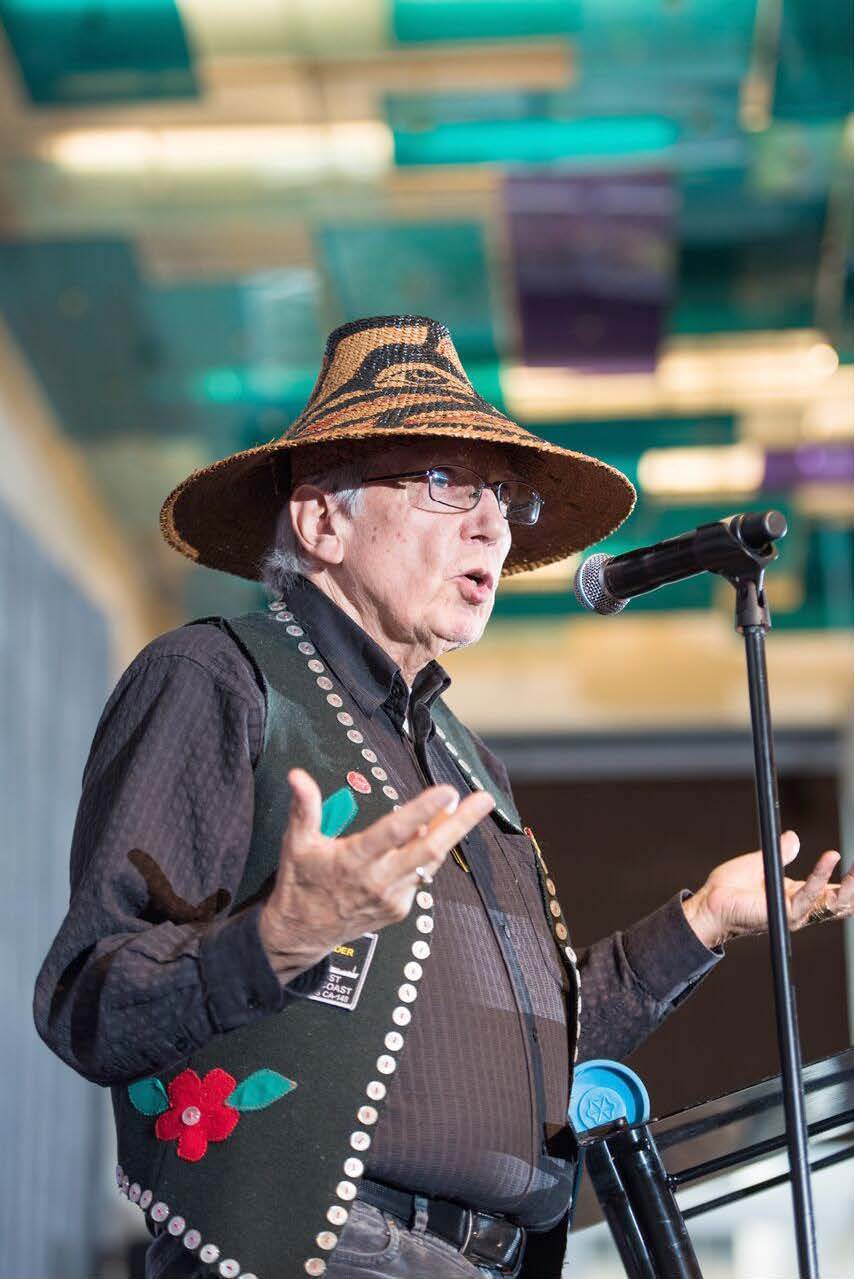Woody is a Family Support Elder at VACFSS. His Haida name, Káawan Sangáa, means “Brings a Special Day”, which he describes as not being a label, rather, a responsibility that describes his character.
Tell us about your background.
My background is Haida, Cherokee, and Scots. I was raised in Haida, Alaska and the name of my territory is Hydaburg (Higdáa G̱ándlaay) which had a population of 300 people; the only access was by ocean or airplane. I was trained by Members of the Haida History Keepers (Tide-Watchers) Secret Society in Haida Oral History (underpinnings of mythology – human interaction with the natural world). At the age of 3 (1944), my grandfather took me to the Tide-Watchers and they became my teachers; some of them were over 100 years old. They taught me the story of all humans and how to maximize the use of memory – it was not something that just anybody was trained for. My father, his sisters and brother were the last of my advisors, my guides, the last fluent K’iis Xaataay (Old Ones) Northern Haida speakers.
At the age of 13, I was sent off to a boarding school in California and stayed with my Cherokee grandparents. I joined the U.S. Navy at the age of 21 and served for 4 years. I then obtained a degree from the University of Minnesota specializing in economics and sociology, and subsequently attended the New Mexico Law School and graduated in 1982.
How many years have you been with VACFSS and what is your position?
I have been working at VACFSS for the last 13 years in the Family Preservation Program, and help facilitate the Strengthening Families and Strengthening Fathers groups along with my colleague, Chuck. I am the guy that goes around and picks up the pieces. I work closely with families and try to find where the relationship may be broken and how they can start fixing it to reunify the family unit. It’s important to understand the dynamics of a family.
My conversations with the parents I work with start by sharing that the way we were taught is, our children don’t belong to us and a wife is a gift.
What brought you to VACFSS?
I was teaching a Haida class at the Friendship Center and there, I was introduced to Patricia. Shortly after, I was hired as a facilitator and then became an Elder for Strengthening Families and attended Bellingham to be trained in the program. Eight years ago we started the Strengthening Fathers group.
What makes an Elder an Elder?
You have to be well-read and have to have a soft mind and care for people’s feelings. I do a lot of talking but I also know how to listen. The way I was raised, I see the world from a whole different perspective from people who may have grown up in the residential school system. I see a world of what is permissible and what is impermissible. I don’t see a world with sin, and I don’t see a world where I always have to compete to be better than somebody else. My conversations with the parents I work with start by sharing that the way we were taught is, our children don’t belong to us and a wife is a gift.
How has the job changed since the pandemic started?
Until very recently, we had to suspend our groups which are held in person. Since March, I was conducting phone call check-ins with 25 clients per week. For some, my calls were the only ones that they received and were so grateful that someone demonstrated cared towards them. We have established such a good relationship with one another, that the clients are also concerned with my well-being.
What do you like most about your role?
When I hear about good stories that have a happy outcome. Recently, a mom we were working with was reunited with her children and she enrolled back in school. I don’t see this as a job, it is something I genuinely enjoy doing.
What do you do outside of work?
I do a lot of screenplay writing and right now, I am editing The First Indian on Mars (which is a comedy). I also enjoy teaching languages, riding my bike, attending cultural events and visiting Granville Island to buy fish.










